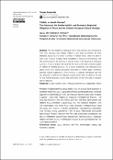Files in this item
Yiddish, or Jewish German? : The Holocaust, the Goethe-Institut, and Germany’s neglected obligation to peace and the common European cultural heritage
Item metadata
| dc.contributor.author | Kamusella, Tomasz | |
| dc.date.accessioned | 2021-11-22T11:30:19Z | |
| dc.date.available | 2021-11-22T11:30:19Z | |
| dc.date.issued | 2021-09-13 | |
| dc.identifier | 276785004 | |
| dc.identifier | 04db5316-5b9f-456f-a235-380ccc5a2e6d | |
| dc.identifier.citation | Kamusella , T 2021 , ' Yiddish, or Jewish German? The Holocaust, the Goethe-Institut, and Germany’s neglected obligation to peace and the common European cultural heritage ' , Śląskie Studia Polonistyczne , vol. 18 , no. 2 , pp. 1-18 . https://doi.org/10.31261/SSP.2021.18.14 | en |
| dc.identifier.issn | 2353-0928 | |
| dc.identifier.other | ORCID: /0000-0003-3484-8352/work/103511048 | |
| dc.identifier.uri | https://hdl.handle.net/10023/24378 | |
| dc.description.abstract | The vast majority of Holocaust victims and survivors were Ashkenazim. Their main language was Yiddish. Yiddish is very close to German, the main difference being that the former is written in Hebrew letters, while the latter in Latin ones. Postwar Europe’s moral foundation is Holocaust remembrance. But this remembrance to be effective, it must be active in the absence of Holocaust survivors. A way to ensure that could be the novel school and university subject of Yiddish for reading purposes. As a result, researchers and interested Europeans would start reading documents and books in Yiddish again. Germany’s premiere cultural organization, Goethe-Institut, is uniquely well-placed and morally obligated to facilitate the relaunch, popularization and cultivation of the skill to read Yiddish-language sources and publications for both the sake of research and for pleasure. | |
| dc.format.extent | 18 | |
| dc.format.extent | 994329 | |
| dc.language.iso | eng | |
| dc.relation.ispartof | Śląskie Studia Polonistyczne | en |
| dc.subject | Yiddish-German language | en |
| dc.subject | Yiddish | en |
| dc.subject | German | en |
| dc.subject | Language politics | en |
| dc.subject | Holocaust | en |
| dc.subject | Germanistik | en |
| dc.subject | Peace studies | en |
| dc.subject | European integration | en |
| dc.subject | European Union | en |
| dc.subject | Jewish studies | en |
| dc.subject | Goethe-Institut | en |
| dc.subject | JN Political institutions (Europe) | en |
| dc.subject | PF West Germanic | en |
| dc.subject | PJ Semitic | en |
| dc.subject | T-NDAS | en |
| dc.subject.lcc | JN | en |
| dc.subject.lcc | PF | en |
| dc.subject.lcc | PJ | en |
| dc.title | Yiddish, or Jewish German? : The Holocaust, the Goethe-Institut, and Germany’s neglected obligation to peace and the common European cultural heritage | en |
| dc.type | Journal article | en |
| dc.contributor.institution | University of St Andrews. School of History | en |
| dc.contributor.institution | University of St Andrews. St Andrews Institute for Transnational & Spatial History | en |
| dc.identifier.doi | https://doi.org/10.31261/SSP.2021.18.14 | |
| dc.description.status | Peer reviewed | en |
This item appears in the following Collection(s)
Items in the St Andrews Research Repository are protected by copyright, with all rights reserved, unless otherwise indicated.

